‘It was an awakening’: Diane Abbott, Nicola Sturgeon, Rory Stewart and more on the books that shaped their politics
Braiding Sweetgrass by Robin Wall Kimmerer
Chosen by Caroline Lucas
The natural world is fundamental to my politics but, like many others, I tended to focus on saving it without always considering our interdependence. It wasn’t until I read Braiding Sweetgrass, Robin Wall Kimmerer’s mix of memoir, call to arms, celebration and warning that I fully grasped the richness of ourselves as nature. Subtitled Indigenous Wisdom, Scientific Knowledge and the Teachings of Plants, this book is about intimately loving our one life-sustaining planet. Wall Kimmerer’s daily practice of gratitude for the uniquely valuable role in our ecosystem played by kin such as the moss spiders or the wild strawberries chimed with the way I was thinking anew about my relationship with the Earth. But it’s also a book about what nature offers in return: her abundant generosity; the moments of joy; the power of the wind, sun and water; the land as everything from grocery store and pharmacy to living link with our ancestors. As Wall Kimmerer writes: “Knowing that you love the earth changes you, activates you to defend and protect and celebrate. But when you feel the earth loves you in return, that feeling transforms the relationship from a one-way street into a sacred bond.” Her words were an awakening, gave new impetus to my campaigning alongside nature writer Mary Colwell for a Natural History GCSE and drew me more recently to the bid by campaigning group We Are Nature to secure a dictionary definition of nature that rejects a viewpoint in which we are dominant and superior to it – and instead better reflects that we are part of it, not apart.
Green MP 2010-2024, former leader of the Green party of England and Wales.
The Female Eunuch by Germaine Greer
Chosen by Diane Abbott
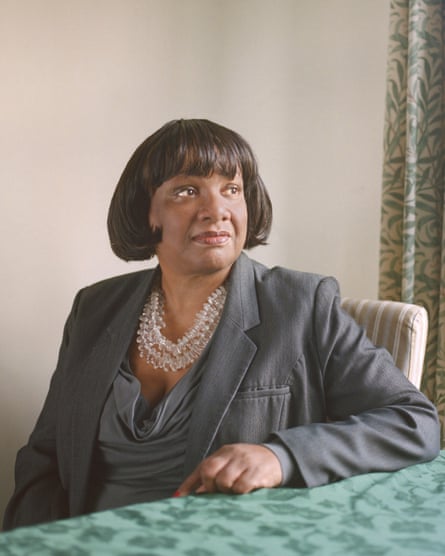
One of the most fundamental aspects of my politics has been my feminism. In the 1970s, as I moved from school to university, this was a new and exciting way of understanding the world. And one of the most important feminist texts of the time was The Female Eunuch. Published in 1970, it was an international bestseller and if you called yourself a feminist, you needed to have read it. Among other things, it deconstructed the submissive role that much of society still expected of women. It was not Greer that made me a feminist. Looking back, I can see my feminism flowed partly from my West Indian background. That society is ostensibly patriarchal, but for generations, strong black women have often been the rock of the family and community. Other things also informed my feminism and belief that women could do anything in the world they wanted to and take up any authority role they chose. I went to an all-girls grammar school where all the staff, including the headteacher, were women. Attending the women’s Cambridge college Newnham also bears some responsibility for my lifelong belief in women’s equality. I read many black feminist writers of the time, such as Angela Davis, Toni Morrison and Alice Walker. They all helped to make me the feminist politician I am today. Back in the 70s many male left activists refused to see feminism as serious politics. Even now male politicians sometimes dismissively refer to feminism as “identity politics”. But equality is at the heart of my politics. This includes social equality, race equality and women’s equality.
Labour MP 1987-2024 and former shadow home secretary.
Team of Rivals by Doris Kearns Goodwin
Chosen by Nicola Sturgeon
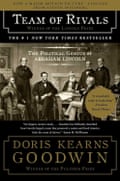
I read Team of Rivals shortly before I became a government minister. I’ve had a fascination with Abraham Lincoln for a long time, and over the years I have devoured many books about him and the US civil war. Team of Rivals, however, is in a league of its own. It had a profound effect on me, and I often found myself leafing through it when I was going through challenging times as first minister – especially during the Covid years, when the pressure of leadership weighed most heavily on me. It is one of the finest character portraits ever written of Lincoln the person, but to describe it as only that doesn’t do it justice. It is, more than anything, a brilliant study of the art of leadership. Through the genius of Lincoln, the book explores many of the attributes successful leaders need (and which few, if any, in the modern age possess to the extent or in quite the combination Lincoln did). We learn about the psychological intricacies of team building; resilience and fortitude in the face of unimaginable adversity; the importance of learning from mistakes – one of the most powerful sections of the book is the account of Lincoln visiting injured troops in hospital after losing the first big battle of the war. He wanted to hear their views on what had gone wrong, so he could amend his strategy, thereby demonstrating the capacity for human empathy that is such a vital component of leadership. Above all, the book reminds us of the power of purpose, of the strength leaders often find when confronted with challenges that transcend day-to-day politics. I would recommend it to every aspiring politician.
Former first minister of Scotland and leader of the Scottish National party; MSP since 1999.
From Yalta to Vietnam by David Horowitz
Chosen by Chris Mullin
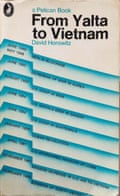
The Vietnam war was the great radical cause of my youth. Even in the isolation of my Catholic boarding school, with only the Times and Daily Telegraph to rely on for information about the outside world, I managed to work out that there was something wrong with the official version of events. From Yalta to Vietnam was the book that confirmed my suspicions. Starting with the carve up of Europe agreed by Churchill and Stalin at Yalta, Horowitz goes on to recount various postwar crises – the Berlin blockade, the Korean war, the US-organised coups in Iran and Guatemala, the blockade of Cuba and, of course, the destruction of Vietnam. In every case the US was painted as the villain and the role of the Soviet Union was downplayed. That, for many years, was my worldview. And to some extent it still is, though these days – thanks to, among others, Robert Conquest’s The Great Terror and Frank Dikötter’s trilogy on Mao’s China – I am under no illusion about communism. But here is the irony: Horowitz, the US radical and author of this book, has turned into a neocon, vociferously repudiating just about everything he ever stood for.
Former cabinet minister, Labour MP 1987-2010 and author. Error of Judgement: The Birmingham Bombings and the Scandal That Shook Britain is published by Monoray.
Animal Farm by George Orwell
Chosen by Alan Johnson
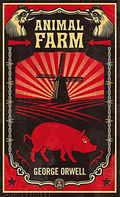
It was 1964 when we 14-year-old boys of Form 4Y at Sloane Grammar were given Animal Farm to read by our English teacher Mr Carlen. Each of us had to read a page out loud before passing Orwell’s masterpiece to the next hinge-lidded desk for the narrative to continue. Mr Carlen’s contribution to our education wasn’t just to introduce us to a brilliant story, it was to explain its subtext. We were gripped by the animals’ uprising against the cruel and inebriated farmer, Mr Jones. It was our teacher who explained that Mr Jones was Tsar Nicholas II and that Snowball and Napoleon, the two young pigs who led the struggle to take over the farm, were Trotsky and Stalin. The word “satire” was becoming common parlance with That Was the Week That Was appearing on our TV screens. For me, nothing could be as perfectly satirical as the alterations made to the “Seven Commandments of Animalism”, in particular the distortion of “All Animals Are Equal” by the addition of “But Some Are More Equal Than Others”. There was another brilliant young teacher at Sloane. Peter Pallai taught us economics. He’d fled Budapest just as the Russian tanks rolled in to crush the Hungarian uprising of 1956. I remember asking if he’d read Animal Farm at school when he was our age. No, he hadn’t. There was a list of proscribed books in communist Hungary. At the top of that list was the Bible – second was Animal Farm.
Labour MP 1997-2017 and former home secretary. His latest book, Death on the Thames, is published by Wildfire.
Is Democracy Possible Here? by Ronald Dworkin
Chosen by Shami Chakrabarti
This was the political book that most significantly “changed me”. Before reading it, I thought of human rights principles as an often vital legal constraint on the excesses of politics. Afterwards, I was completely convinced that they could also provide both inspiration for democratic politics and policymaking and the values capable of binding even fierce ideological rivals together in respectful and productive debate.
I had come across Professor Dworkin’s more academic legal philosophical work many years earlier as an undergraduate. However, five years into the “war on terror”, the more deliberately practical and political book – covering legal exceptionalism in the face of terrorism and the roles of religion and taxation in politics, was invaluable to me as director of Liberty. Very American in context, its argument for the “red and blue” of a divided United States to unite around the core human rights value of dignity seemed equally apposite to the UK, albeit with the coloured shirts worn the other way round. In the throes of UK and US elections Dworkin’s 2006 warnings and encouragements stand the test of even more challenging times for rights, freedoms and democracy all over the world.
Human rights activist, life peer, barrister and former Labour shadow attorney general.
Rivals in the Storm by Damian Collins
Chosen by Rory Stewart

This very recent book is an astonishing argument for the power of politicians at a time when it often feels as though there is no power anywhere. Politicians feel stifled by the civil service, by the media, by business and international markets. All of those other institutions feel equally stifled. After 14 years of Conservative government, it’s difficult to believe that we have succeeded in addressing the fundamental challenges of our age. And we are in some doubt as to whether an incoming Labour government will have more success. We feel our politicians are useless. But in Collins’s book we see Lloyd George – not even as prime minister but as chancellor – shifting the most fundamental issues of public policy, often almost single-handedly. He appears to have a preternatural ability to get to the nub of an issue and bring insights not available to the specialists. Lloyd George is able, for example, to challenge the conventional wisdom of the generals and push for a different approach to munition production from the one that they recommended. And rather than failing as an amateur in the face of experts, Lloyd George seems to spot things that they miss. He does it not just through his raw intelligence but an extraordinary combination of charisma and feel for the public. Collins emphasises the importance of Lloyd George’s speeches – the care that he put into their construction. He focuses in particular on a 1914 speech in which Lloyd George draws on his non-conformist heritage, and the peace of Welsh valleys, to make the case for conscription and war.
The book should be inspiring to anybody who fears that their vote is wasted and who hesitates to get involved in politics. But I’m also very conscious of how far I fell short of this example of leadership. And how far short so many of us seem to fall. A splendid reflection on leadership and power, written by a serving member of parliament, deep inside the institution of politics.
Brady-Johnson professor of grand strategy, Yale University; a former UK Conservative cabinet minister, an MP 2010-2019, author of Politics on the Edge (Vintage).
Letters to My Grandchildren by Tony Benn
Chosen by Mhairi Black
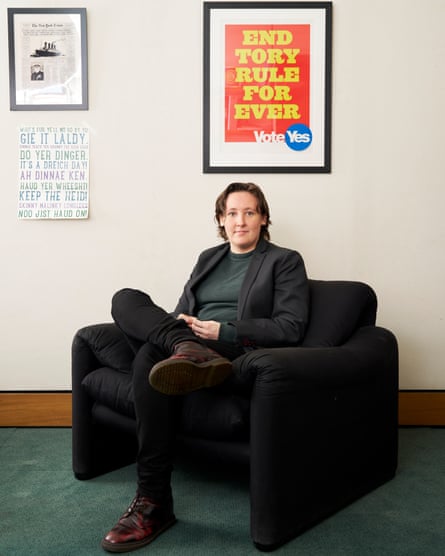
It is no secret that I admire and have been inspired by Tony Benn. The truth is that I was enamoured with his words long before I ever heard him speak. Reading his 2009 book, Letters to My Grandchildren, felt like discovering a new band for the first time. One of the biggest problems in politics is that most people are intimidated by it. They believe they’re not qualified or informed enough to challenge the powers that be or change the society they were born into. This book connects the dots of power to show how that mindset is often the very barrier holding us back. Benn educated people without ever patronising them. His ability to condense complex, far-reaching issues – such as defence, technology, healthcare, housing – into understandable, matter-of-fact letters is something I have aspired to do throughout my life. It undoubtedly influenced my own approach to debating and writing speeches for the House of Commons. At 15 I was inspired by people who seemed to be sincerely guided by their morals and their desire to see a better world. Nelson Mandela, Martin Luther King Jr and Marsha P Johnson are just a few names that jump to mind, but discovering this book was the first time I had come across an authoritative figure who wrote with such clarity and compassion about British politics. Most of all, the unapologetic humanity that is weaved through every argument he makes served as a secular sermon of sorts for my young atheist heart. To be honest, it often still does.
Scottish National party MP 2015-2024. She was 20 when first elected.
On Liberty by John Stuart Mill
Chosen by Simon Hughes
Which book to choose – from a long shortlist? The Bible, Shakespeare, Dickens, Orwell, Forster, Grimond, Mandela, Helen Suzman, Lloyd George biographies or Bermondsey Story, Brockway’s biography of my greatest predecessor Alfred Salter? None “changed me into a Liberal”. That was done (aged 14) by the 1966 Liberal manifesto!
But. Written by the great radical London philosopher John Stuart Mill and published in 1859, six years before he became independent Liberal MP for Westminster, On Liberty is why as lawyer, MP and civil liberties minister I could never be a socialist, social democrat, Green or Conservative. A great, short and not difficult read, Mill’s book is as relevant now as ever. It is not about “liberty of will” but “civil or social liberty”, the need always to challenge the “tyranny of the prevailing opinion and feeling”. Mill’s “very simple principle” is that “the only purpose for which power can be rightfully exercised over any member of a civilised community, against his will, is to prevent harm to others. His own good, either physical or moral, is not a sufficient warrant.” Liberty of conscience, discussion, expression, action and association follow. We must resist the imposition of majority beliefs on those who do not share them. Mill also sees liberty as a means of improving human character and happiness – “individuality, as one of the elements of wellbeing”. As Liberal Democrat federal president, my symbol of office was a copy of On Liberty. As a justice minister, one of my responsibilities was to try to stop illiberal legislation. Now, as a voter, I am determined to ensure that the UK – with no written constitution – never ceases to be bound by the European convention on human rights. Liberties left undefended by the courts may never be recovered.
Liberal Democrat MP 1983-2015 and former minister of state for justice and civil liberties. Now chancellor of London South Bank University.
Popper by Bryan Magee
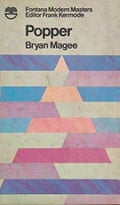
Chosen by Daniel Finkelstein
The primary inspiration for my politics was the experiences of my parents. They were keen that we had a normal childhood – and they succeeded. But having a mother who had been in Belsen and a father who had nearly starved to death on the edge of Siberia inevitably shaped my views. Then, in my early 20s, I read a short book, recommended to me by my brother, that helped me understand what had happened to Mum and Dad in terms of ideas rather than just stories. Bryan Magee’s Popper is a short biography and critical review of the philosopher Karl Popper. It describes his theory of science and moves from that to critiques of Plato and Marx. It made me appreciate that the Nazis and the Soviets made a common error, how they were united in a way of thinking that was bound to lead them to murder their opponents. Reading that book was a crucial moment in the development of my thinking. Popper’s ideas underpin my belief in pluralism, my resistance to utopian and revolutionary movements, and my gentle conservatism. The book made me see the problems with both a reactionary failure to adjust my opinion and a radical fervour based on overconfidence. I gave it to my nephew Simon when he was a baby, along with a copy of Winnie-the-Pooh. I’ve no idea if, when he grew up, he ever read it. But he is now involved in politics, too, and we do share broadly the same views.
Journalist and Conservative peer. His book Hitler, Stalin, Mum and Dad is out now in paperback (William Collins).
William Wilberforce by William Hague
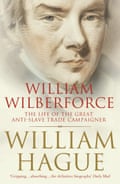
Chosen by Andrea Leadsom
The reason to become an MP is surely to make the world a better place. This is maybe not something voters would believe right now of many politicians, but having a focus on changing things for the better is what has driven my politics. The political book that has most inspired me is William Hague’s on William Wilberforce. A Yorkshireman, Wilberforce began his political career in 1780, and a few years later he became an evangelical Christian. He went on to become the greatest English abolitionist, leading the parliamentary campaign against slavery that led to the Slave Trade Act of 1807. While he had his detractors, who accused him of fighting overseas enslavement rather than social injustice at home, I think it was his focus that led to his ultimate success – better to create one world-changing improvement than to shout loudly and ineffectively about everything. Wilberforce helped to change the world for the better, and his approach should set an example for every aspiring politician.
Conservative MP from 2010 to 2024 and author of Snakes and Ladders, published by Biteback.
Source: theguardian.com



